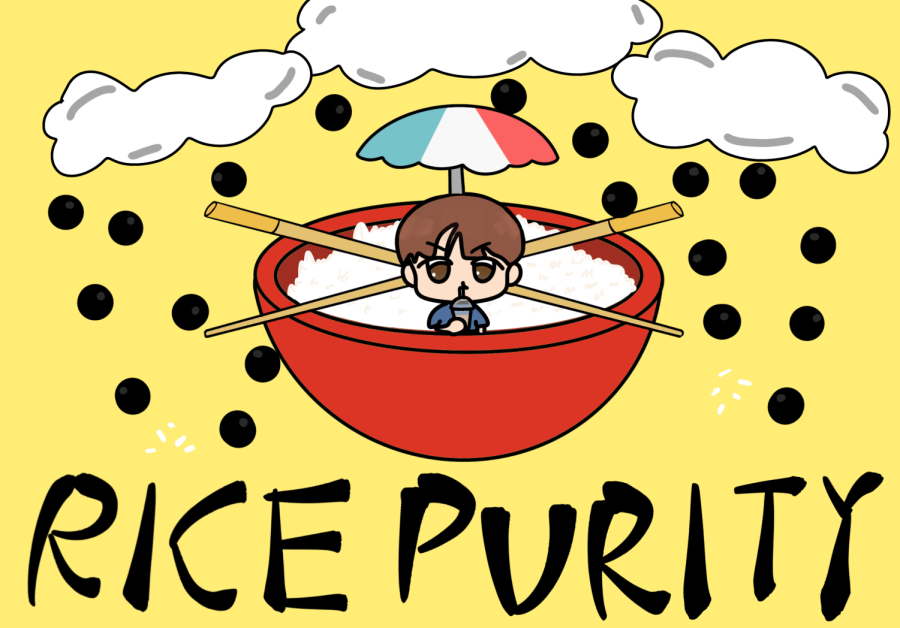Fu: You CAN have too much boba, actually
This is “Rice Purity,” a column covering all things gaysian America, sex and scandal.
March 1, 2023
When I arrived in Evanston — 18-years-old, Massachusetts-raised and ready to kick off my college career — one of my first thoughts was: “Where are all the Asians?”
At home, I know the places to be. For a haircut, I would stop by my favorite one-man hair salon. For steaming hot tteokbokki or budae-jjigae, I know any place on Allston Street will knock it out of the park. And for groceries, pastries, dim sum and spicy noodles that make your tongue dance, I know Chinatown always delivers.
These places were all second homes to me. There was something comforting to me about the pump of EDM radio stations, honking cars and fragrant smells. Coming to Northwestern, I felt like I had to start over. While I didn’t find much, I did, however, find six boba tea shops, all a stone’s throw away from each other. Cute.
Downtown Evanston seems to be picking boba to present diversity. There’s a bankable foreignness to it — white people love Asian things. White people who search for meaning often seem to land on Buddhism, and white economics students always seem to take Chinese language and culture courses. White twinks grow bamboo, and white men love Asian wives. Strange.
It feels like Evanston has chosen East Asianness to serve as acceptable “diversity,” a clean and cute “diversity.” This harmfully reduces East Asianness to a mere aesthetic, minimizes South, Southeast Asian and Pacific Islander experiences in describing Asianness and effectively deems Latin American, African and African American cuisines as less desirable.
Beyond boba, downtown Evanston has also seen a rapid influx of ramen restaurants, with Tomo Japanese Street Food, Hokkaido Ramen and Ton-ichi Ramen all opening within the last year. I find it weird that Evanston keeps attracting duplicates — multiple ramen restaurants and boba tea shops — instead of opening up quite literally anything else. For starters, where is the fast food? Where are the restaurants serving food that isn’t middling, over-priced East Asian food? It feels like the good old brand of American racist and classist with an East Asian beauty filter on top.
Maybe it’s not that deep, and I’m just overthinking it. It might have nothing to do with Evanston’s values and how developers want the city to look. It could have to do with the fact that boba chains all see Evanston, Illinois as a booming market because there are many wealthy college students with the petty cash for expensive boba prices. Or perhaps, this is because of the sizable Chinese international population that comes to NU for its world-class academic reputation and also likes to drink boba.
It could also be a simple cost-benefit analysis — boba shops tend to have low food costs, because tapioca and teas can last for a long time without going bad. That said, Evanston doesn’t seem to be trying to diversify its food offerings at all, which still feels violent.
We’ve got a lot of boba shops on our hands. But an abundance of tapioca doesn’t necessarily translate to a deep sense of belonging for East Asian students, despite our student groups often partnering with local boba shops for profitshare events.
And to be clear, I do love boba. I like to get boba as a chill activity with friends, and it is something incredibly familiar to me, having spent my childhood floating between China and Chinatown. I believe a fruit tea with lychee jelly can fix a bad day. So I’m probably the target demographic for these boba shops.
But there’s a point where there’s too much. And I think we’ve reached it.
I know I certainly didn’t hear of the latest boba tea store opening, and think, “Oh my gosh, Evanston loves me now.” I actually did not drop to my knees and weep about how Evanston’s sixth boba shop finally provided me the opportunity to return to my roots and celebrate my culture. Instead, I rolled my eyes a little, made a little mental note to check it out later and moved along with my life.
Yiming Fu is a Medill junior. He can be contacted at [email protected]. If you would like to respond publicly to this op-ed, send a Letter to the Editor to [email protected]. The views expressed in this piece do not necessarily reflect the views of all staff members of The Daily Northwestern.












